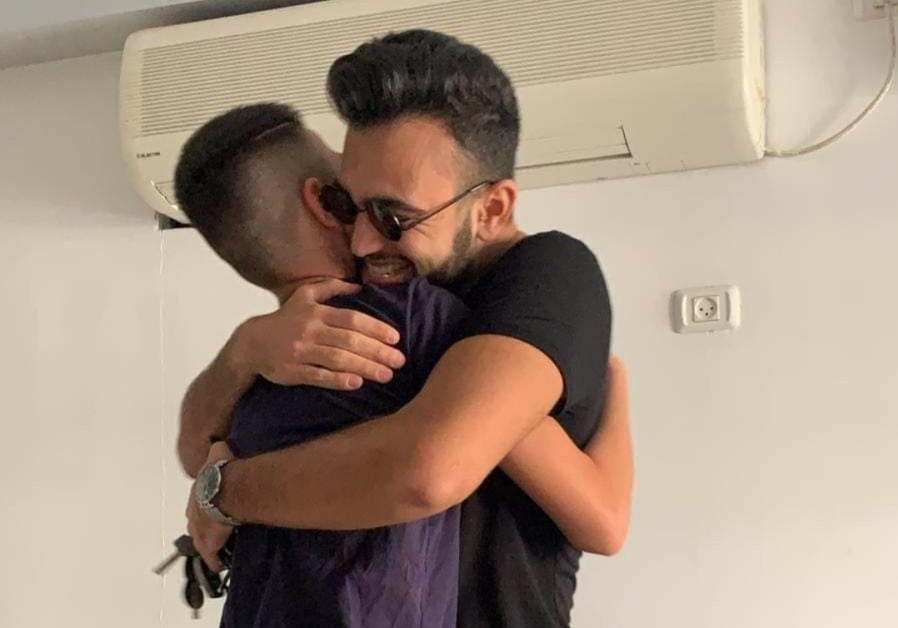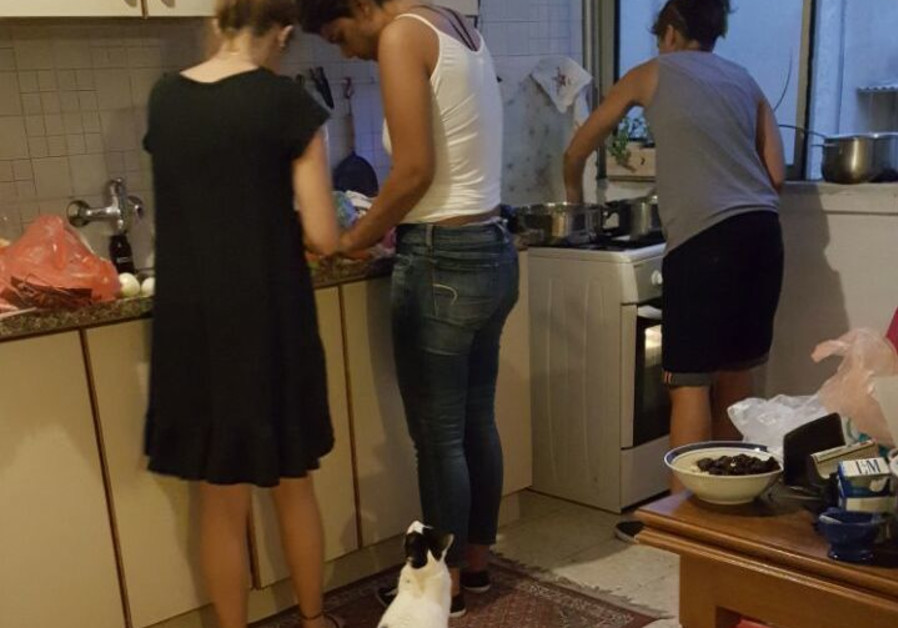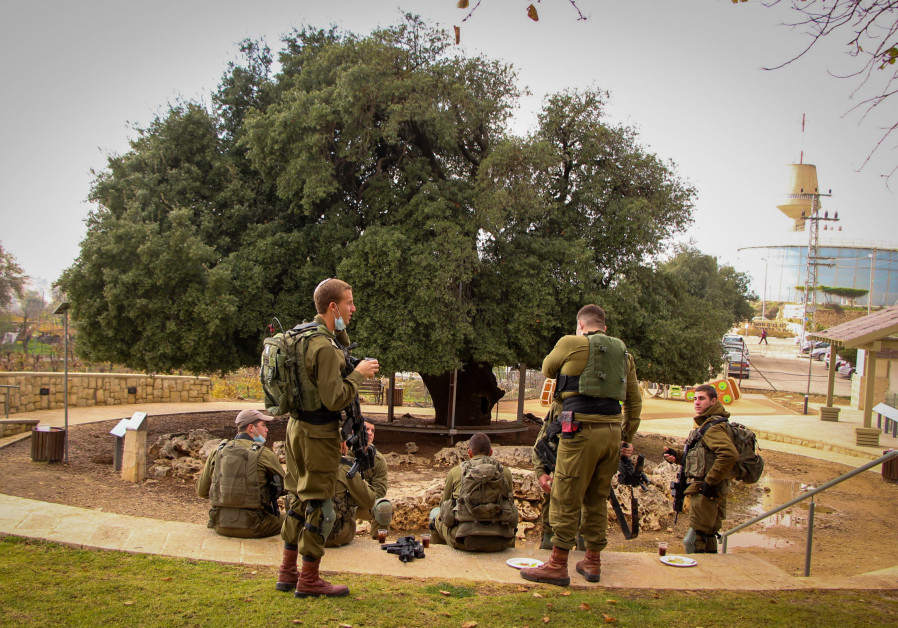A difficult moment Yaniv Aharoni remembers from his mandatory IDF service is when he was told he would be released a week early due to a technicality. Any other soldier would have been ecstatic, as it is very common for those serving in the IDF to count the months, days and then minutes until their discharge. But Aharoni was an unrecognized lone soldier, and his housing was completely dependent on his service in the IDF.
Aharoni found himself begging the administration on his base not to release him early, and beseeching the staff at the Beit Chayal (IDF off-base housing for soldiers) to let him stay for a few days, but no one could help and Aharoni ended up sleeping in his car for the first few nights after his release.
“I was so helpless,” said Aharoni, remembering the moment.
Some of these soldiers come from observant homes that don’t accept them once they stop being observant, some have abusive parents, or parents who struggle with mental illness. All come from homes that cannot provide them with financial or emotional support.
Soldiers who fit into this category are not always awarded official lone-soldier status by the IDF and thus do not qualify for those benefits. Some submit a request many times before it is finally accepted.
If Aharoni had been recognized as a lone soldier when he was released in 2018, he would have benefited from a three-month adjustment period during which he could have kept his army housing and would have been eligible for numerous housing grants for released lone soldiers. He also would have received extra financial support over the course of his service, preparing him for the adjustment to civilian life – but Aharoni’s requests to be recognized as a lone soldier were denied multiple times.
Aharoni’s father was regularly violent towards his mother, and he thinks that one reason his father kicked him out during the second year of his mandatory service was for him defending his mother. Aharoni says he could not return home; his family broke off contact and he received no financial support from them, but was still not awarded lone-soldier status.
That meant Aharoni did not receive tens of thousands of shekels worth of financial support from the army, was not eligible for multiple programs for lone soldiers (run both by the IDF and by various nonprofit organizations) and was not guaranteed lone soldier “errand days” or special leave to work. For Aharoni and many others like him, this created an almost impossible situation.

HAREL LEVI (who asked his real name not be used) found himself in this situation toward the end of his first year of service. He had submitted a request for recognition as a lone soldier soon after his draft, and received the status for one year. When the year was up and Levi resubmitted the request, it was denied.
Levi doesn’t know why; the IDF never gave him a clear answer he could understand. According to Levi, nothing had changed in his life since his first request was accepted.
He was forced to try to support himself on his regular IDF salary – approximately NIS 1,600 per month. He paid NIS 1,300 for rent and food, and was left with NIS 300 monthly for everything else. He vividly remembers trying to buy a sandwich on his way to base and having his card declined. He checked his account and realized he had a balance of NIS 3.65.
“You can’t forget that,” recounts Levi. “Living hand to mouth and what the army gives you is socks and tank tops.”
Levi left his parents’ home permanently at around age 16. When he was younger, he would often leave for days or even a month at a time to get away from what he describes as a home that was “impossible to live in.” A strained financial situation, violence and a bad relationship between his parents forced him out and motivated him to request lone-soldier status when he was drafted.
Levi sums up the experience of being released from the army in 2019 as an unrecognized lone soldier, saying he felt like the IDF “takes you, breaks all of your bones, breaks you and then sends you on your way and tells you to stand on your own feet and fix yourself.”
Recognized lone soldiers are invited to join multiple mentorship programs after their service to assist them with the transition into civilian life. These programs help them find jobs, apartments and furniture, apply for schools and scholarships, and more. Unrecognized lone soldiers are generally not eligible for any of these programs.
Levi says he “doesn’t have words to describe” his treatment in the army when submitting requests for continued recognition as a lone soldier. From some officers and officials, Levi felt utter contempt. They “knew I was in distress and didn’t do anything,” Levi insists. At one point in the process, he requested a meeting with the officer in charge of approving or denying his request.
“The officer called me a liar to my face. He told me I was lying [in my request] and that I am in contact with my parents.”
Menachem Estryk, who was recognized as a lone soldier during his third year of service after multiple denied requests, also recalls being accused of lying while seeking recognition. Estryk was out of food in his off-base apartment. His commander agreed to bring him something to eat from base, and Estryk asked him to bring hot food for Shabbat. Estryk thinks this request was what prompted his commander’s commander to call and tell him that if he wanted food for Shabbat, he could stay on base and that the reason he would not be recognized as a lone soldier was because he was a liar.
Aharoni notes of the process of requesting recognition: “I felt like I was under a magnifying glass and something was wrong with me. They examined me so much and I felt accused [by them]. [I felt that] they were asking not out of a desire to help but a desire to judge me. I felt criticized.”
IRIS ZILKA, a social worker who works with youth with no family support, explained that soldiers often remember the challenges and suspicions they faced when requesting lone-soldier status despite the more material challenges their situation creates.
“It is hard enough to tell yourself you are alone in the world,” says Zilka. “They need to tell many people time after time that they cannot live at home. It is very hard.”

Lone soldiers fighting for recognition are pained by the thought that “they don’t see me, they don’t understand me or the situation I am in,” says Zilka. Soldiers might feel the IDF sees them as attempting to game the system.
Zilka has worked with multiple soldiers whose requests for lone-soldier status were denied despite having grown up in welfare housing frameworks after being removed from their parents’ homes by court order.
“Sometimes they are removed against their or their parents’ wishes,” notes Zilka.
“To do your service when they don’t believe you and think you are lying and making things up, when you need to prove your reality, even though welfare has already determined that you can’t live at home and pays for you to live in a welfare framework,” is extremely difficult, asserts Zilka.
There are a number of ways parents can make it difficult for their child to be recognized as a lone soldier. Sometimes parents are not honest with the IDF; this can be because they are embarrassed to reveal their inability to support their child.
“Part of the complication is that [in the recognition process] the IDF asks parents if they want their child to live at home, but just because parents want them to live at home, doesn’t mean they can,” the social worker says.
Estryk’s parents lied to the IDF outright. He thinks they told the IDF they approved of his service and that he could live at home – despite this being untrue – because they wanted him to be in a difficult situation that they hoped would pressure him to leave the IDF and return home to a religious lifestyle.
Another way parents can complicate their child’s recognition process is by being in contact with them. There is no official rule that states lone soldiers must not have contact with their parents. Despite this, such contact, no matter how limited, seems to be a determining factor in whether or not a soldier will receive lone-soldier status in some cases. There also seems to be a gap between official regulations and how army “Tash” NCOs, those who are responsible for soldiers’ service conditions and submit lone-soldier status requests, understand what kind of contact is allowed.
Anomalous lone soldiers “are not allowed to have any relationship whatsoever with their parents in order to be [recognized as] lone soldiers,” says Stav Donni (who asked that her real name not be used). Donni is a former Tash NCO who worked on a base for combat soldiers and finished her mandatory service in 2019.
“There are so many examples out there. The second [the IDF] hears you talked to your mom two weeks ago or your dad, then they don’t care about the fact that you don’t get money from them or that you haven’t lived with them for years,” Donni continues.
Not permitting soldiers to contact their parents isn’t logical, according to Donni.
“You only have one set of parents so it makes sense if they are willing to talk to you, on the phone, even if they can’t support you, even if they don’t give you that unconditional love, that you’re still going to be in touch with them. You still want them in your life in whatever way they can be.”
Zilka says she has also encountered instances where contact with parents seems to be a qualifier for lone-soldier status.
“In practice we see that officers are taking [the soldiers’] phones and asking when they spoke to their parents,” adds Zilka, who agrees with Donni that this situation does not make much sense.
Zilka explains why contact with parents can be vital for soldiers. In more troubled families, “parents are often dealing with a lot,” says Zilka, “and the child often takes responsibility for a lot of the things that, in a more functional family, the parents would do.”
Zilka mentions numerous reasons young people who are wholly unsupported by their parents may maintain contact with them; often they feel a sense of responsibility toward younger siblings, or act as go-betweens for their parents and outside factors. Sometimes they are helping parents pay bills.
“This isn’t a total cut of ties. But in a meaningful way, it isn’t that these soldiers can be supported by their families. Quite the opposite.”
THE IDF says that in the past few years the criteria for being recognized as a lone soldier have been expanded and every request is examined carefully in its own right in as sensitive a manner as possible.
“My officers know to evaluate every case for itself,” Chen explains. “We are not robots. There are people taking care of people [in my department] and we act sensitively.”
Her department is in charge of approving or denying all requests, and does extensive research on every case, including contacting soldiers’ families and those who know them well, Chen adds. A soldier who is not eligible for lone-soldier status will get a personalized solution, whether that includes sleeping arrangements or financial grants, according to the IDF.
Chen notes that her department works with nonprofits and welfare organizations to perfect their response for every population and to learn how to better identify lone soldiers. Chen confirms that a soldier can receive lone-soldier status even if they have contact with their parents.

They are also no longer referred to as “anomalous,” according to Chen. Although the official order regarding lone soldiers still refers to them this way, the IDF now calls them “lone soldiers with no familial support.”
The IDF adds, “The Lone Soldier Center was founded in March 2020 to serve lone soldiers 24/7 out of recognition of this population’s unique needs. The center accompanies soldiers from before they draft and until a few months after they are released.
“The center reaches out to accompany soldiers in a complete and sensitive way and is a source of information and help for the soldiers and their families on a number of topics and in a number of languages.”
The writer was a lone soldier in the Israel Air Force.
